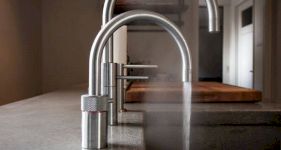New Toilet Cost
- The average new toilet costs around £450 in 2026.
- It typically takes around 4 hours for a plumber to complete this job.
- A breakdown of how much different types of toilets cost, as well as the factors that impact prices you're quoted by tradespeople.
- How long replacing a toilet takes and an overview of what the process of installing a new toilet looks like.
- How to find and hire a local plumber in the UK.
Want to find out how much a toilet installation costs in 2026?
You'll typically pay between £200 to £600 to install a new toilet toilet. However, the prices you're quoted will depend on a few key factors.
This guide will go through everything you need to know — so you're crystal clear about what to expect the cost of a new toilet to be in your circumstances.
Ready to get a quote for a new toilet?
MyJobQuote has a Trustpilot score of 4.8 (30,000+ reviews) and is used by more than 1 million homeowners across the UK every year.
Share a few details about what you're after and we'll connect you with plumbers near you. It's a quick and easy way to get free, no obligation quotes from local tradespeople.
Want to find out more before you start comparing prices?
Take a look at the full guide below!

£450
Table of Contents
- How Much Does Toilet Replacement Cost?
- How Much Is a New Toilet?
- How Much Does a Plumber Charge to Replace a Toilet?
- What Impacts New Toilet Costs?
- Additional New Toilet Costs
- What's Involved in a Toilet Replacement?
- Can I Replace a Toilet Myself?
- Choosing a Toilet
- Hiring Contractors to Replace a Toilet Checklist
- FAQs
How Much Does Toilet Replacement Cost?
Let's look at average costs...
The average cost for a toilet installation usually falls between £200 to £600. However, the prices can vary depending on the type of toilet, your location, and whether any additional plumbing work is needed.
How long can installing a toilet take?
A toilet installation takes, on average, around 2 to 4 hours to complete. However, this can vary depending on the type of installation, the difficulty of the job, and whether there is any extra plumbing involved.

How much will it cost me to hire someone to replace my old toilet?
New Toilet Installation Prices
The table below shows the average costs for buying and installing a new toilet. While most replacements involve a simple swapping of old toilet for a similar model, you can also use this guide to plan for different styles and upgrades.
| Job Description | Total Costs |
|---|---|
| Close-coupled toilet | £200 – £400 |
| Hidden/wall hung cistern | £550 – £800 |
| Low-level cistern | £275 – £430 |
| High-level cistern | £300 – £480 |
| Specialist hands-free toilet | £1,900 – £2,500 |
| Removal and disposal of existing toilet only | £75 – £100 |
How Much Is a New Toilet?
If you're looking just for the supply costs (without the labour fees), check out the table below:
| Job Description | Supply Only Costs |
|---|---|
| Close-coupled toilet | £100 – £200 |
| Hidden/wall hung cistern | £250 – £400 |
| Low-level cistern | £125 – £200 |
| High-level cistern | £150 – £250 |
| Specialist hands-free toilet | £1,500 – £2,000 |
How Much Does a Plumber Charge to Replace a Toilet?
Next up, labour fees and timesrames...
The labour costs for fitting a toilet will depend on several factors, including the type of toilet you're having fitted, whether any additional plumbing work is needed, and your location.
How much will you spend on labour?
The average toilet installation labour costs are around £100 to £400, and the average length of time for this type of job is approximately 2 to 4 hours.

Plumbers usually charge around £40 to £60 per hour on average, so if there is any additional plumbing work needed to fit your new toilet, the costs could add up.
How much would it cost to replace toilet with a new one?
If you live in London, will the costs go up?
Those based in London can expect to pay around £50 to £200 more for the labour costs of fitting a toilet than those based in the North or other parts of the UK.
What Impacts New Toilet Costs?
There are a number of cost factors when it comes to fitting a toilet. Below is a list of the cost factors that you may need to be aware of for this type of job:
Type of Toilet
The type of toilet that you are having installed will affect the overall cost of the job.
A close-coupled toilet will cost around £200 to £400 in total to be installed, whereas a hidden/wall-hung toilet will cost about £550 to £800 in total for the installation.
What are the best compact toilet options for small spaces?
Check out these for a good starting point:
Tavistock Structure Back To Wall Toilet, Vitra S20 Short Projection Wall Hung Toilet, Vitra Layton Corner Toilet, or the Moods Tilia Rimless Wall Mounted."
Additional Plumbing Work
If there is any additional plumbing work needed to install the toilet, this can add quite a bit in labour costs onto the job.
A typical plumber will charge around £40 to 60 per hour so, depending on how long the additional plumbing work takes, you could find yourself spending a few extra hundred pounds on to the job.
Location of Property
The location of your property can affect the overall cost of having your new toilet installed.
Those based in London can expect to pay around £50 to £200 more for the labour costs of fitting a toilet than those based in the North or other parts of the UK.
Seasonality
When you choose to have your toilet replaced can also affect the price. Our data shows that weekend installations cost around 20% more compared to weekday jobs.
In addition, winter installations can be up to 40% more expensive than summer, as plumbers are typically busier during the colder months.
Additional New Toilet Costs
There are a number of additional costs that you may need to consider when it comes to fitting a toilet. Below is a list of some things you may also need to think about with this type of job:
- New bathroom fitting — £6,000 to £8,000
- Disconnection and removal of existing toilet — £75 to £100
- Build and tile frame for hidden cistern — £350 to £500
- Install downstairs toilet — £2,500 to £2,500
How much is it to turn a small downstairs toilet into a shower room?
What's Involved in a Toilet Replacement?
The steps below outline what a professional plumber will typically do when replacing your toilet.
- Remove and dispose of the old toilet.
- Check pipework carefully, replace any damaged pipes.
- Prepare the area and remove/replace any tiles or flooring before starting the new installation.
- Measure up the area ready for the installation.
- Remove the soil cover on your new toilet and then add the wax ring.
- Connect your new toilet to the soil pipe.
- If your new toilet is a floor standing toilet, secure it to the floor now. If it is a wall hung toilet, fit and secure it to the wall at this point.
- Next, install the cistern tank.
- Connect the water pipe into the cistern.
- Turn your water on.
- Test for leaks and proper flush function.
- Finish the area with any finishing touches that need to be done.
What's the minimum amount of floorspace you need around the toilet? How much room should you leave between this and the sink?
Can I Replace a Toilet Myself?
It is entirely possible to change a toilet yourself as a DIY job as long as you have the relevant knowledge to do a good job. It may take you a little bit longer to complete the job than it would a professional plumber since they have all of the skills and knowledge necessary to complete the job quickly.

Many people shy away from hiring professionals due to the costs; however, you may end up spending more by doing it yourself if things go wrong with the installation. If you don't connect the pipework correctly, you may end up with leaks — which could be costly to fix.
Fitting the pipes even slightly wrong can result in some severe consequences, such as water damage, which can result in excessive costs.
Can I install a toilet on the front wall of my house without adding a visible waste pipe?
Choosing a Toilet
Below is a list of the different types of toilets that you can get:
Close Coupled Toilet Cost
This is the most popular style of toilet where the cistern is attached directly to the pan.
Close-coupled toilets are available in both traditional and modern designs with an array of colours available to suit everyone's taste. This type of toilet is usually around £100 to £200 on average.
Pros
- ✔ Doesn't require any external or hidden plumbing
- ✔ Wide range of colours and styles to choose from
- ✔ Easy to install
- ✔ Suits most bathrooms
Cons
- ✖ Can look plain/boring compare to other options
Corner Toilet Cost
A corner toilet is designed specifically to fit in the corner of your bathroom to maximise the use of the space in the room. These are great for smaller bathrooms or for a downstairs loo.
It can sometimes be difficult to install the waste pipe into the corner, so it's worth checking with a qualified plumber before installing a corner toilet. These toilets typically cost around £150 to £300 on average.
Pros
- ✔ Stylish and modern-looking
- ✔ Great for saving space
- ✔ Perfect for small bathrooms
Cons
- ✖ Can be difficult to install
Wall Hung Toilet Cost
Wall hung toilets are great for adding modern style to your bathroom. It floats above the floor without any visible pipework, fittings, or cistern. It creates a sense of extra space and makes cleaning the floor much easier.

The cistern on wall-hung toilets is installed within the wall, saving you lots of space. Wall hung toilets tend to cost around £250 to £400 on average.
Pros
- ✔ Great for saving space
- ✔ Makes it easier to clean the floor
- ✔ Modern, stylish look
- ✔ Perfect for smaller bathrooms
Cons
- ✖ Much more difficult to install
- ✖ Concealed cistern and wall frame must also be purchased
Low-Level Toilet Cost
A low-level toilet is perfect for when you want to add traditional style to your bathroom. This is where the cistern is fitted at a low level on the wall, and it is connected to the pan of the toilet via a chrome flush pipe.
This type of toilet tends to cost around £125 to £200 on average.
Pros
- ✔ Creates a traditional look
Cons
- ✖ Must be fitted to a solid wall or wall that has been reinforced
High-Level Toilet Cost
High-level toilets are also great for creating that traditional style in your bathroom. A high-level toilet is where the cistern is fitted at a high level on the wall and is connected to the toilet pan via a chrome flush pipe.
On this type of toilet, the flush is controlled via a long chain pull. This type of toilet usually costs around £150 to £250 on average.
Pros
- ✔ Provides a traditional look
Cons
- ✖ Must be fitted to a solid wall or wall that has been reinforced
Hiring Contractors to Replace a Toilet Checklist
Before hiring a professional plumber to replace your toilet, there are several important factors to consider to ensure you get a quality job at a fair price:
- What is the cost breakdown? Ask for a clear breakdown of costs so you know what you are paying for each element of the job.
- What types of toilets can they fit? Confirm the contractor has experience installing the type of toilet you have chosen.
- Do you need to supply the toilet? Find out if the toilet is included in the service or if you need to provide it yourself.
- How much experience do they have? Check how many years of experience they have with bathroom/toilet installation.
- How long will the job take? Ask the contractor for an estimated timeline for the work.
- Is old toilet disposal included? Check whether the contractor will remove and dispose of the old toilet.
- What parts and materials are included? Confirm what is included in the service, such as wax rings, bolts, and the toilet seat.
- Can you see references or reviews? Ask for references or check online reviews of previous work.
- Are they insured? Confirm the contractor has public liability insurance in case of damage or accidents.
- Do they offer guarantees or warranties? Check if the contractor provides guarantees or warranties on their work.
FAQs
What is the best way to clean a toilet?
- Start with the outside. Work your way up from the foundation to the lid by spraying the underneath thoroughly. Spray all area including the small area between the seat and tank, and the tank itself.
- Next, spray down both sides of the lid.
- Then, spray both sides of the toilet seat and then lower it back onto the bowl once it's been thoroughly sprayed.
- While you're waiting for the disinfectant to dry, clean some of the tougher points that are more prone to germs. Clean the toilet flush handle, especially as this can be one of the dirtiest parts of a toilet.
- Once it's mostly dry, give your entire toilet a wipe using a sponge.
- Clean the bowl using some toilet cleaner and a toilet brush.
- Always finish your cleaning session with a good flush.
Can I replace a toilet myself?
How do you replace a toilet seat?
- Remove all of the old fixings.
- Once the fittings have been removed, lift away the old toilet seat
- You can then add the new seat fixtures to your toilet. Screw them in loosely without fully tightening in case you need to adjust them later.
- Check the distances between the fixture pins and measure them up against the new toilet seat. Set them to the right distance and then tighten them up.
- You can now fit your new toilet seat by popping it onto the pegs via the fixing holes on the seat.
- Check that your seat is in good working order and then you're good to go!










